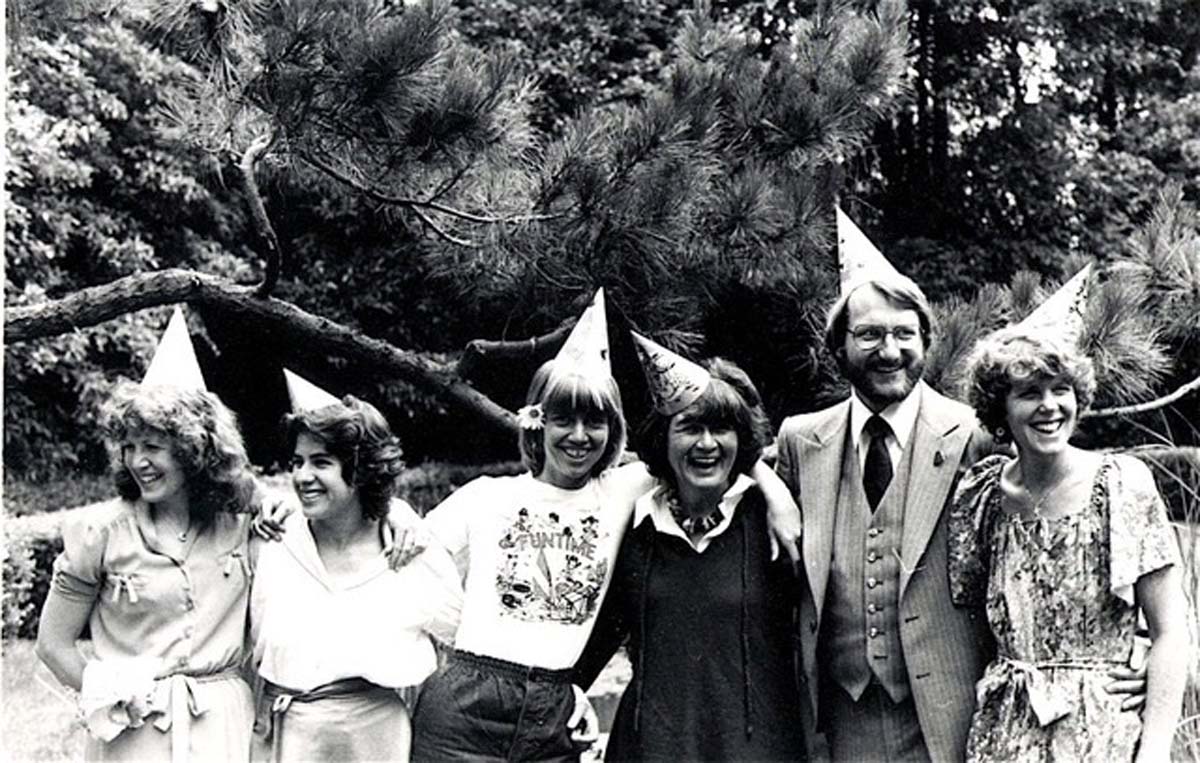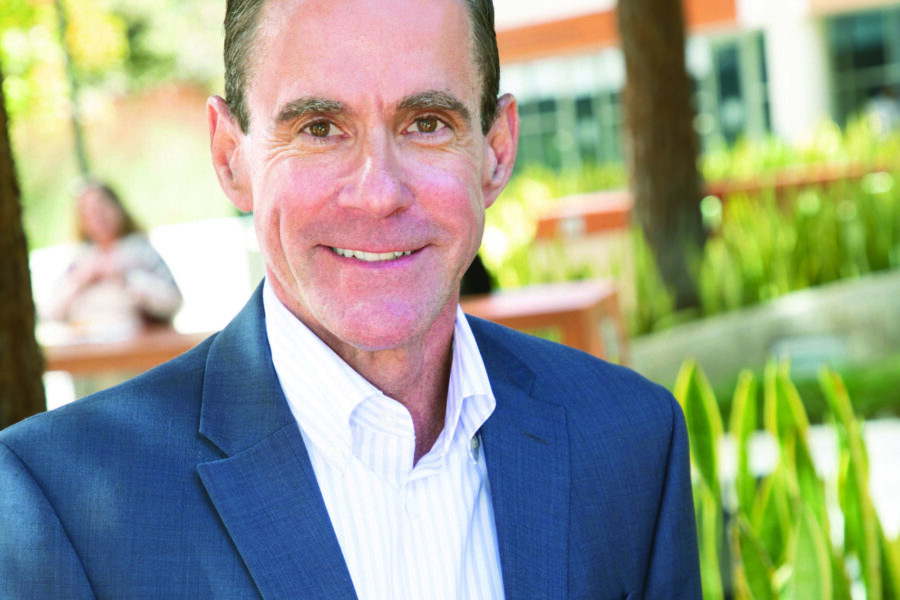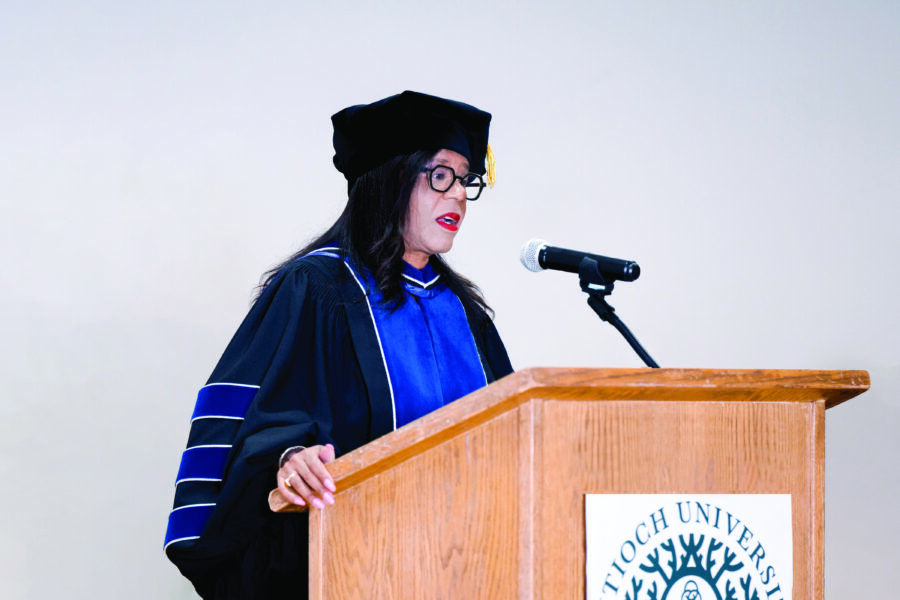Santa Barbara in the 1970’s: stunningly beautiful yet possessing a fragile ecosystem that is vulnerable to natural catastrophes like wildfires and mudslides. It was the site of an infamous 1969 oil spill, but since then it’s become known for awareness around preserving and stewarding the local wildlife and delicate ecological balance. Another contrast: it’s known as a wealthy, privileged enclave but is also considered a down-to-earth, open minded, and welcoming small city where music, arts, and education thrive. Santa Barbara is fertile ground for new ideas, organizations, and communities.
And in 1977, a new center of education opens its doors: an Antioch satellite campus with, at the start, just twelve people enrolled. Its administrators are trying to build it into something that will offer a unique educational experience attuned to the individual needs of its students while continuing to uphold and build upon the high standards of education envisioned by Horace Mann when Antioch College was founded in Yellow Springs in 1852. They are working in the shadow of UC Santa Barbara, a big state school with a big, beautiful campus. Yet they know there are students searching for things the bigger school doesn’t offer.
Consider this campus, which is being founded largely by women. Look at how they are hustling to get this thing going, what obstacles they are overcoming as they plant the seeds of this campus—and the challenges they are coming up against in daring to be passionate and ambitious about their professional goals at a time when women are still doing the dance steps backwards and in high heels. Join them as they work towards the great rewards of persevering.
The Visionary, the Organizer, and the Accountant
Lois Phillips arrived in Santa Barbara in the early ’70s, and she first worked for Ventura College, for the Ventura County Affirmative Action Training Project, and for a local television network, where she hosted a talk show. That’s where she met Pearl Fisher. They bonded over both being New Yorkers in California—and when Lois was tapped to be the founding Executive Director of Antioch’s new Santa Barbara campus, Pearl was her first staff hire.
Lois: So in a smaller city where networking is critical to doing anything, it was possible to launch a campus in three months. If you work like a dervish, which I did.
Pearl: I had worked with Lois previously. She started one of the first public access television shows in Santa Barbara, and I worked at that facility. That’s how we met, and when she was hired by Antioch she begged me to work with her. And I really was hesitant to do that.
Lois: I was hired July first—and October first, we opened. And we opened with an MA in Psychology and a BA in Liberal Studies. I think there were twelve students in one program, seven in the other, but it was enough to open.
I found space. I hired faculty. I promoted the campus. I interviewed like crazy. There was no email, you know. There was no social media. It was all pick up the phone and talk. So I spoke to the Rotary, the Chamber of Commerce, the MIT Forum, my Santa Barbara City College friends—who were very, very helpful because they were dealing with community college students who wanted to finish degrees—and the MFT association, because the therapists knew people who were in transition and wanted to finish their degrees. I was just everywhere.
Pearl: She’s very persuasive, and she talked me into it. So we started together, we trained together, and we went through all of the craziness. Lois really shouldered the majority of it, as the head of it.
Lois: I knew what a meticulous, detail-oriented person Pearl was and that she was also a lot of fun. We were both from New York, so we had that sense of dry humor and sarcastic banter that made it fun to get through those first three months. So I hired her to be—and they allowed me because we didn’t have any income, I had a certain amount of money to hire one person—I hired her to be financial aid and admissions, which is a really big job. I don’t think it’s even legal [to have one person do both jobs].
At the beginning, Pearl was the one who potential students would talk to about whether they could get financial aid. And because she was so delightful, people really felt confident about getting aid and enjoyed meeting her so much. And then she helped them with the admissions process. It was daunting: if you’ve been out of school, you look at all these papers. So she would sit and go over them.
Pearl: I’m not a salesperson. I’m very honest, sometimes to a fault. I never said anything bad about Antioch, but I would warn prospective students that it was a new program, and that they were basically the pioneers of that program, and that they were going to be a very strong factor in making or breaking it. So it was kind of what we had to offer and what they brought to it that was going to determine the future of that program. I have to say that that group, you know, could complain about things, and they had a right to, but they were excited about the idea of pioneering a new program, and they stuck with that.
One of the reasons I decided to take the job was I thought I could get a free master’s degree. I had my undergraduate degree in psychology, so I thought it would be a perfect opportunity for me. We had such a tiny student body. It was all women and one man. Seven students to begin, I think, in the master’s program. It was a very small group. And I felt like it wasn’t established enough. It wasn’t solid enough for me to do the master’s degree at that point.

Lois: Pearl did go back to school and get a master’s degree in counseling, because she said, ‘You know, I developed a lot of human relations skills from this job.’ So she earned her MA while she was working full time at Antioch. Then very quickly we hired another person to take on the admissions process.
Jack Sternheim was the first—I don’t want to dignify the position as a CFO—but he was the accountant for the campus. And he was also, by the way, from New York. And he was meticulous also, and so responsible. Both Pearl and Jack loved being part of Antioch. I think we felt that we were part of a birthing. You know how a kind of collective camaraderie will occur? That made it really fun.
Pearl: I’m highly educated and yet I’m not highly ambitious. I never have been. I’ve always kind of wanted to take a path that was least stressful and most interesting at the same time. So I was afraid that it was something brand new that I had never done before.
Lois knew that I had skills and could be easily trained for it. But Lois was the visionary. She always had ambition, the drive, she wanted to be in charge. I never wanted to be in charge of anything. But I loved working with visionary people. And carrying out their vision. So I was very good at doing that. Lois and I were very opposite in the way we worked. She kind of fit the stereotype of the brilliant, creative mind—and I was Miss Organized, which she needed very much. But that’s why I was just concerned about whether it’d be too challenging for me, whether it was what I wanted. It was a very good choice.
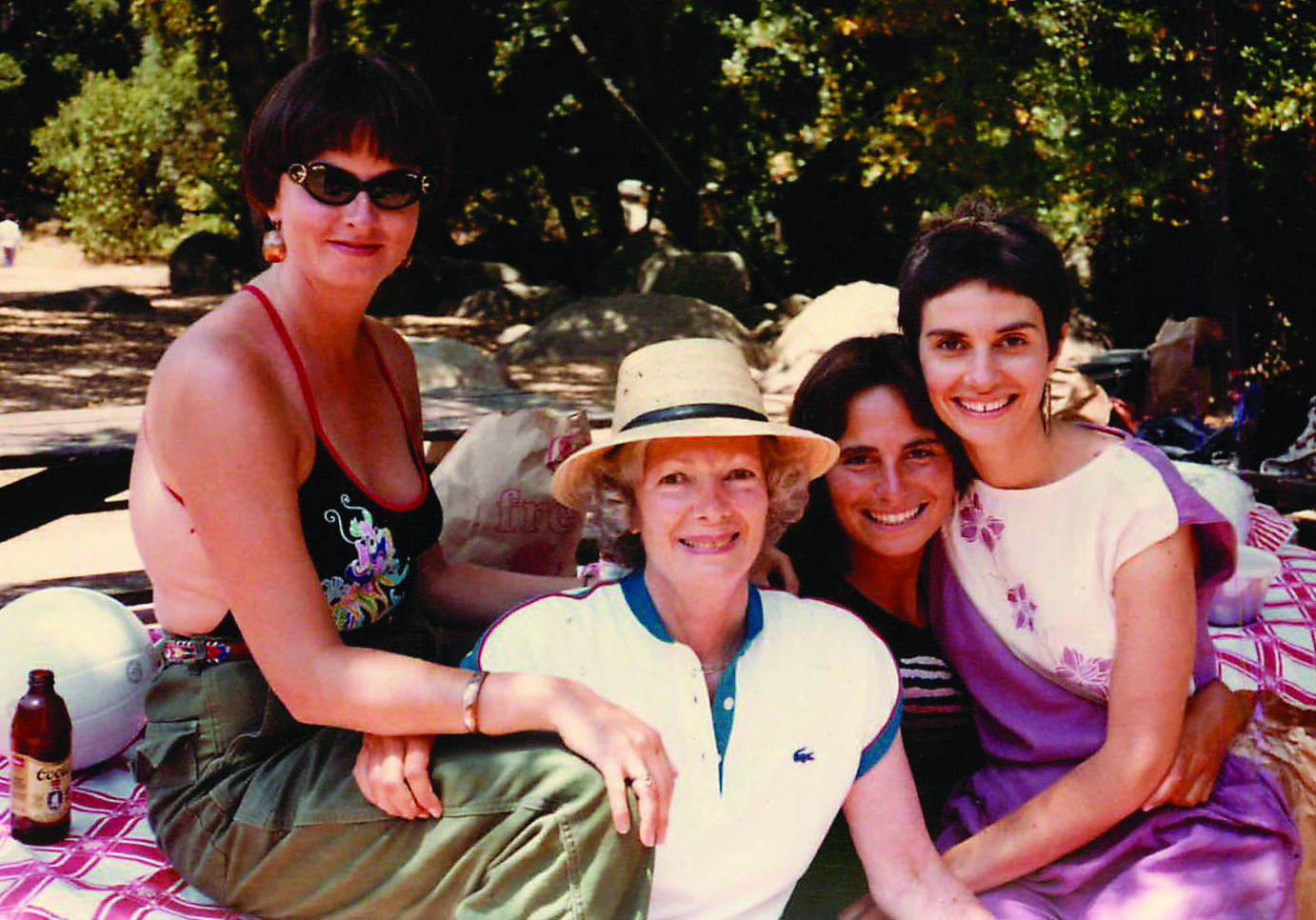
Finding a Niche in Santa Barbara
Part of what has set Antioch undergraduate programs apart over the last fifty years is that the University will work with students to award credit for previous learning experiences—even if those haven’t come in a classroom. For Santa Barbara students who had dropped out of undergraduate programs, or never started them at all, being able to get credit for the things they had learned by actually living and working was often transformative, both putting a degree within reach and ennobling and making official their very real lived learning experiences..
Lois: I remember one student ran Tom Hayden’s campaign. You might remember Hayden, he was married to Jane Fonda. So here we have this famous film star, running in California, campaigning for the U.S. Senate.
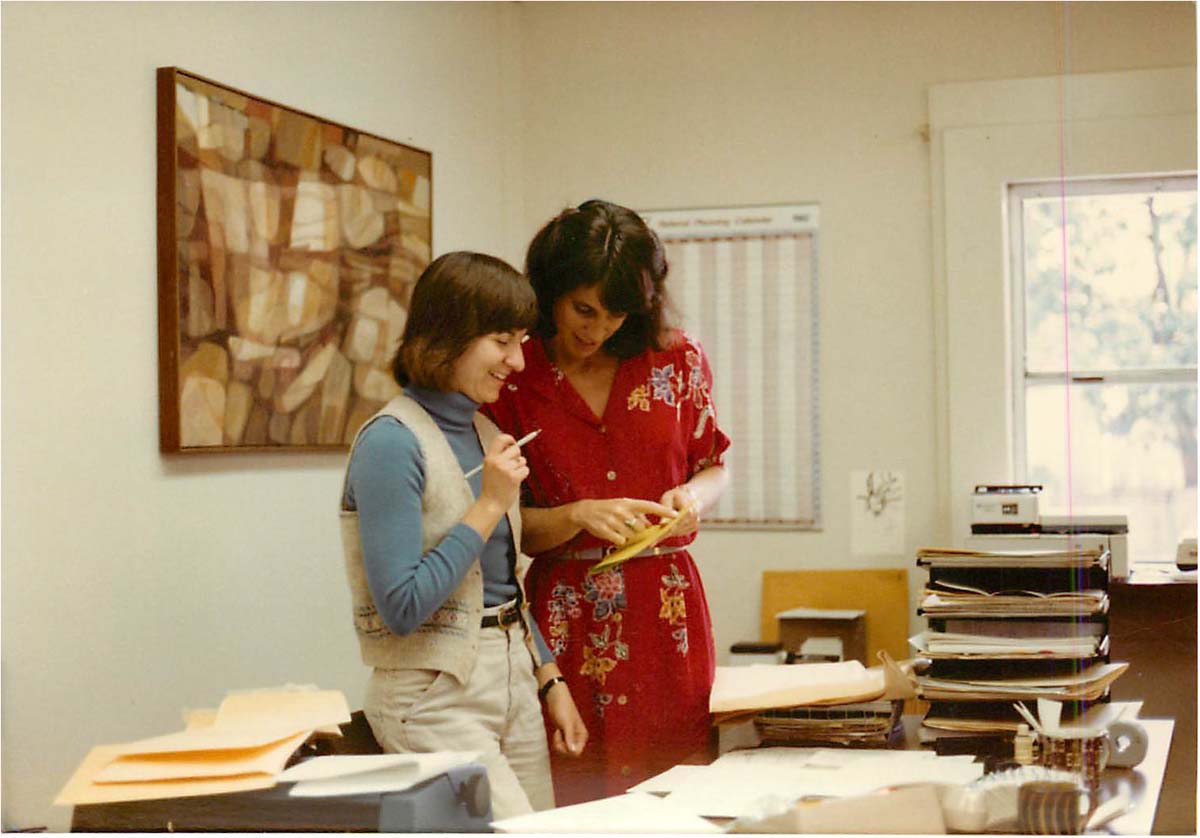
Hayden narrowly lost the Democratic primary race against the incumbent, John V. Tunney, and several years later the campaign manager decided to return to school—and to turn her whirlwind political experience into college credit.
Lois: She had been up and down the coast. She worked tirelessly. This student came to Antioch after the campaign was over and said, “I have a lot of stories to tell, one of them is running a campaign as a small business.” So we looked up courses describing what was learned, and just pulled every example she gave of, you know: running the profit loss statements, and keeping track of monies, and dealing with the state requirements for a campaign, and on and on. And it was like, Wow, this really fits what would have been a course. And she said, “I learned everything in this course from running this campaign,” and she documented it. That’s just one example of transferring a fabulous life experience. She said, “Now I’m gonna finish that degree,” and she went on to get a doctorate.
Karen Kinrose was hired in 1981 as a receptionist, and within a few years she was the Academic Services Officer—and a student herself.
Karen: When I saw the ad for a job at Antioch, I applied, and I soon found myself with a group of wonderful people on a lofty mission to make an alternative bachelor’s degree program in Santa Barbara a success. Lois began to use me as an editor as well as a typist. And Pearl was, well, Pearl. Her office was across the hall, and we became very close and remain friends. Pearl was Lois’s right hand person for getting over administrative hurdles in the beginning and helping students get financial aid. She was the heart of Antioch, in my humble opinion, while Lois was the powerhouse.
So, when we moved to the Santa Barbara Street location, things really started jumping. It was like a beehive that had students, teachers, prospective students who came for our information meetings, and also new admin help: Jack Sternheim and Candace Etz. We had a lounge area by my reception desk as well as other places for students to hang out together. Of course this made for a lively workplace. Eventually Pearl and I both decided to get our master’s degrees in counseling psychology. So we became totally woven into the fabric of the place.
Lois: Santa Barbara was very much a provincial city with very, let’s say, 1950s attitudes. And so in the ’70s I was able to find what was bubbling up. And the university scene was growing. So there were women who came to UCSB with their husbands, and they were, you know, putting their husbands through a PhD. And so they came to me because, “I want to finish my degree,” or “Now I’m divorced: he left me for his grad student.” So it was like, “I have to find my voice. I have to get it together.”
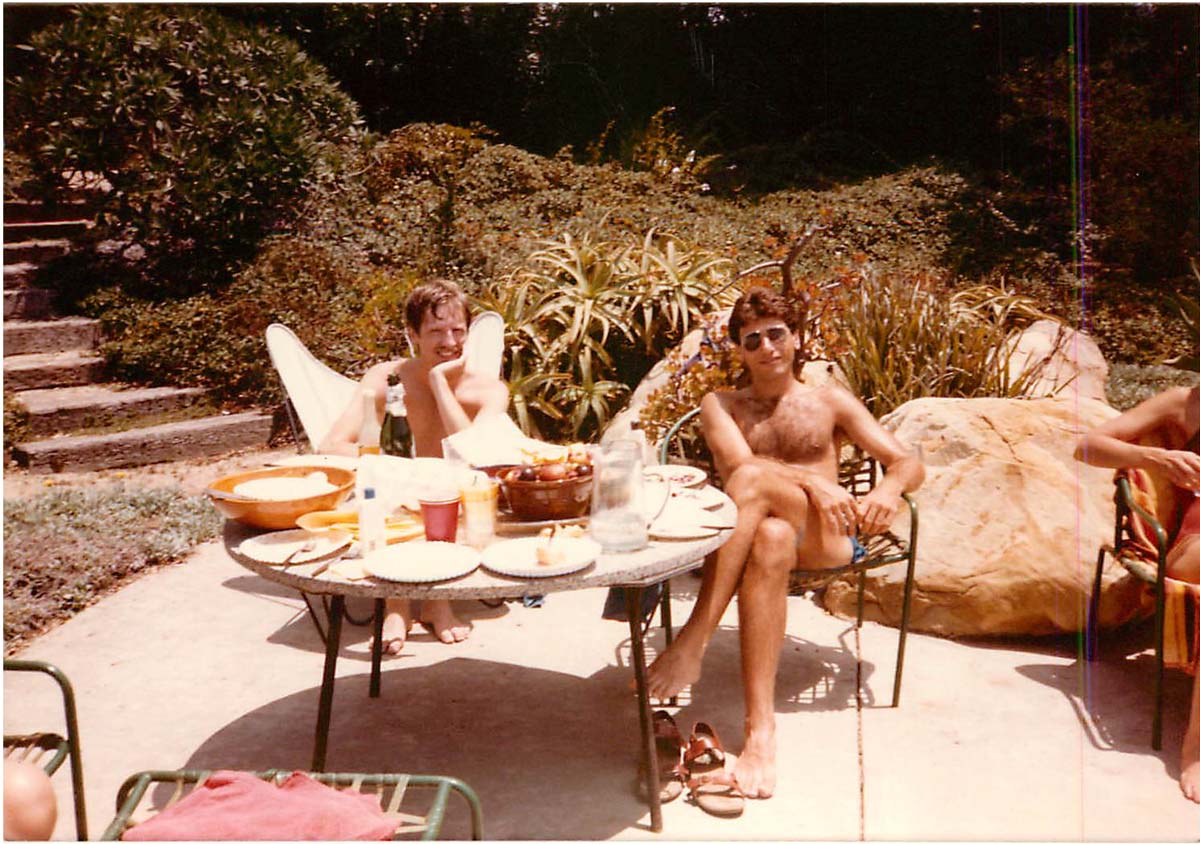
Finance Director Jack Sternheim.
There was that, and then there were the hippies. UCSB’s growth was tied to our potential for success. The ’60s consciousness had begun to affect lawyers and women going into law. Women wanted to become lawyers—especially, I would say, wanting to work in government, health care, social welfare organizations. But they couldn’t without the degree. I don’t mean to overstate our importance, because we were small and remain small. I think maybe there were 500 students. Some part time, some full time toward the end of my time there. But as we grew, we had to keep moving. So I moved the campus, let’s see—three times in eleven years. And it was very stressful. But each site got better. Each was a better site, and we ended up in a beautiful space now.
Pearl: I always found people’s lives interesting. The odd thing about me in terms of fitting into that kind of world—Santa Barbara was a very spiritual hotspot. Still is, I guess. And I’m a New Yorker, a Jewish New Yorker. So I’m very skeptical about a lot of this New Age stuff. I was very open—and yet I didn’t want to hear it expressed so much. Like, just live it. Just don’t talk about it so much. And the group at Antioch tended to be very expressive about those kinds of things. So I had a very push-pull thing. I think Lois didn’t work as closely as I did with them.
And there were other instances when I was a student. I remember I was in a class, and there was a student behind me talking during the instructor’s lecture. And finally I turned around. I said, “Please, please, can you just keep it down?” And he said, “Oh, am I pushing your buttons?” And then my New York-ness really came in.
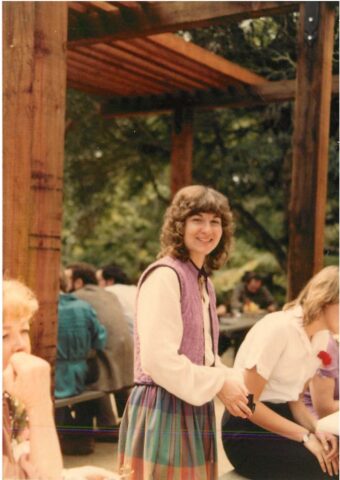
Mixing Marketing Strategy & Social Justice
Lois: We did two free, public conferences while I was there. I had this big Rolodex. I was able to get very interesting experts in these fields to speak and it kept us visible in the media—which was basically the newspaper back then.
One conference was on the changing nature of the family. Participants got to hear men talk about being a single parent raising kids. One was raising kids through widowhood and one because the wife left, moved to another state. And they got to hear women’s point of view about being a single parent. They could compare them. I loved that. I love dialogue. I love people, you know, providing an interdisciplinary perspective. And I wanted to grab headlines to promote our programs.
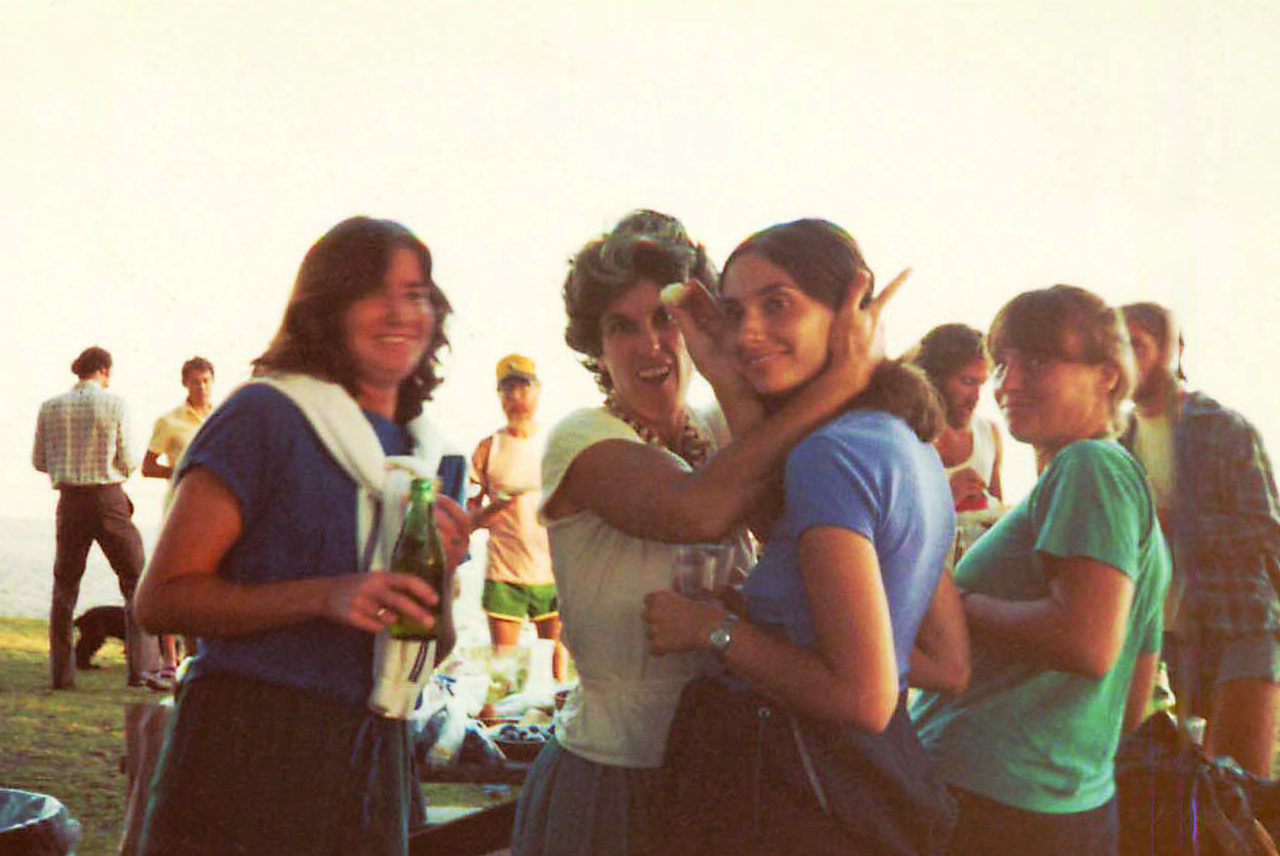
When Norene Wheeler arrived to complete her BA in 1979, she knew she had found her place. She went on to complete her MA in Psychology there, too. After graduating she served for several years as Interim Chair of the BA program—and used her role to promote issues she cared about.
Norene: At one point I got a grant to put on a conference. This was when the AIDS crisis was hitting the front pages. I wrote for grant money to put on a series of lectures with speakers in the health industry. It was called, “Who Lives, Who Dies, Who Decides.”
It was a little controversial. I got a call from somebody at UCSB, a gay man that had some concerns about how it was being represented. At that time, a lot of people were worried that it was going to be considered the gay disease, and they were the plague for bringing that to the public, which was not what was happening. There were some people eager to believe that, so I certainly understood his concern. We talked, and he ended up coming to the conference.
The people who were speaking, we were medical people and social work people and social science people. We were trying to understand what was going on. What was this disease really about? Who was doing something to fix it to cure it? What did we know? What should we anticipate? What kind of funds were there? What kind of research was going on? All the questions you would have. It’s like when COVID hit, right? Nobody was quite sure what to make of it at first, in terms of what to do about it and how serious it was.
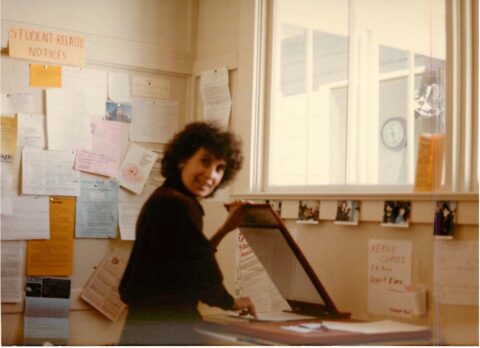
Community Values of Integrity & Care
Pearl: I’ve always been very serious about all my jobs. I take great pride in my ability to do my work. I also wanted to bring a sense of fun to things. Again, it was that time. So I started collecting windup toys, and I would have all these windup toys on the desks, for the students who were waiting to register. It was all done manually. There were no computers. Think about that. Everything was by hand. So I had things for them to play with. We would just have fun as we went through the process. Financial aid was done by hand. I kept track of everybody’s financial aid. Paper and pencil.
It backfired once, because my reputation for meticulous record-keeping grew throughout all of the Antioch system. I was known for it. And I remember the Head of Financial Aid, who was really the head honcho for the whole system in San Francisco at the time, he said—I think at one point there was a mistake, I made a mistake—and he said, “We never checked because you never made mistakes.” And I said, “You realize that situation you’re putting in!” Wow, to have those expectations! Because I will be bound to make mistakes. It wasn’t a terrible mistake, but it was a mistake.
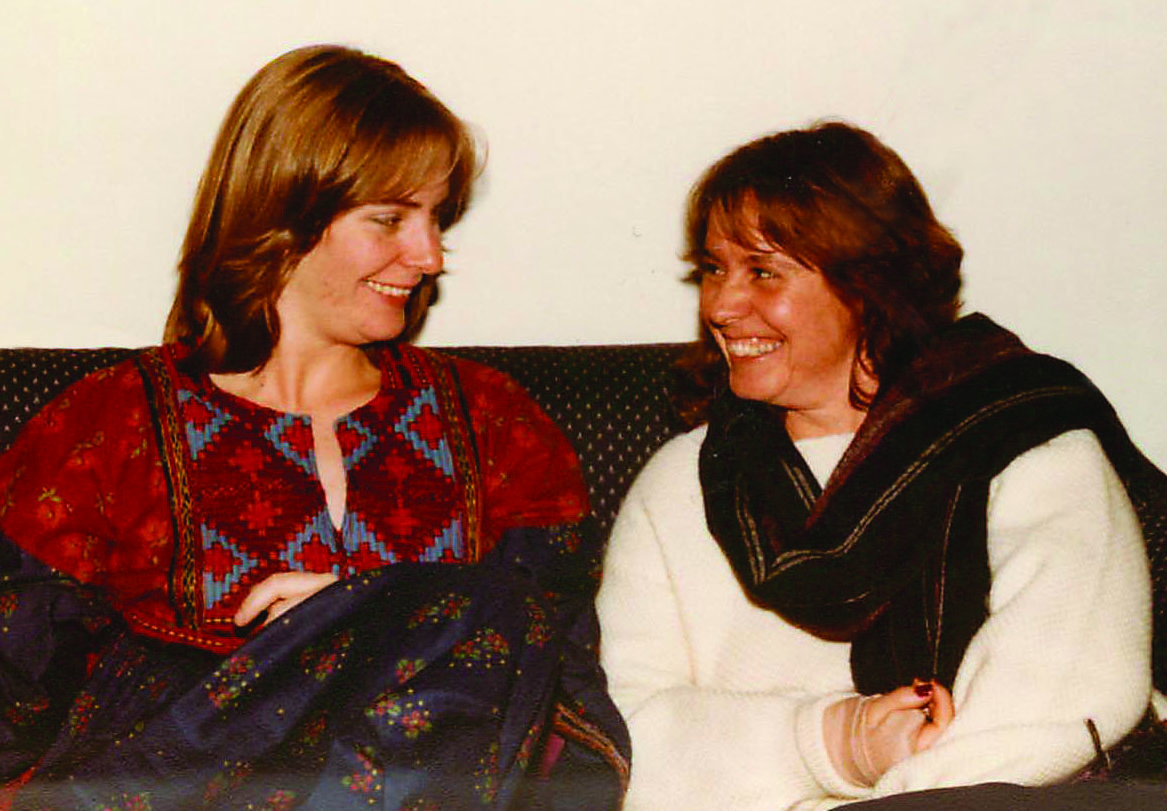
I remember I was a bit neurotic as a child with doing everything perfectly. My mother used to say, “Make a mistake. You’re human. This is not normal.” And then—this did happen at Antioch—a student told me, she said, “You’re very robotic. You’re like a robot with things, with the rules, sticking to the rules.” And I remember taking that fairly seriously. It totally changed me. I thought, She’s got a point. Yes, rules are there, but you need to remember things are not black and white. Again, I was still young at the time, so I was trying to do the right thing. And even though they say I was very open and warm to people, I went by the rules. After that I started to consider things. How strong should this be? How rigid should I be? I really became flexible after that. So that changed me dramatically.
The spirit of mutual, practical support continues to the present day, according to Anna Kwong, the current Chair of the Santa Barbara BA Program.
Anna: One thing that is very, very unique about Antioch is that we support each other. This is a place where everyone will say, “Hey don’t work too late, take a break, go for a walk. Let’s do something healthy.” It’s about mental health. During the 2018 fire we had an evacuation, and one of my dogs passed away because of the trauma and everything. My other dog was left alone—it’s very sad. And one of my colleagues actually helped to calm my dog, because she’s an expert in these things. It was amazing. I had not heard of that. But she did. Can you imagine that we care that much about each other?
Pearl: I was diagnosed with breast cancer during my time at Antioch. I was 31. That really showed what Antioch was to me at that time. I had to bring people in to cover for me. I was told by the President of Antioch—who I’d never met at the time—to take as much time off as I needed, that I would be paid. Not to worry.
Lois: We were once called “the jewel in the crown” by Alan Guskin, when he was Chancellor, because our records were so meticulous, and the feedback from students was so positive. And it was because we were so small that we knew everybody. We knew who was distressed, we knew who needed to take a break, we knew who was the star student.

